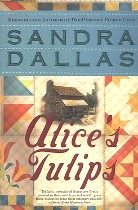 Sandra Dallas •
Sandra Dallas •
Alice’s Tulips •
“There’s no hereafter,” announces Mother Bullock one evening at supper. She’s not being heretical; it just means she hasn’t made any dessert.
Alice Bullock’s husband, Charlie, has “gone for a soldier” in the Civil War. Left at home to tend Bramble Farm with only her crotchety mother-in-law and a hired man for company, Alice pours out her heart in letters to sister Lizzie. “I couldn’t teach a dog to bark,” she laments, but that doesn’t keep her from offering advice. When Lizzie’s husband is losing interest, Alice recommends greeting him at the door clad in nothing but an apron. We see only Alice’s side of the correspondence, not Lizzie’s answers, so are left to speculate about the success of this experiment . . . until five months later when Alice congratulates Lizzie on her pregnancy.
Alice’s piquant colloquialisms reflect the turbulent 1860s, the rural Midwest (Slatyfork, Iowa), and her own social status. Though still in her teens and largely uneducated, she is a shrewd observer, characterizing an unscrupulous womanizer as “all ruffle and no shirt.” A homesick neighbor “has hung his harp on the willow.”
As the conflict grinds on, Alice and Mother Bullock take in a succession of strays: “copperhead” (antiwar Democrat) Annie, orphaned Piecake, blind Joybell. Alice copes with frostbite, deprivation, backbreaking labor, and ceaseless worry about Charlie, who has been captured and taken to Andersonville. In the rare letter that reaches Alice, he begs her not to send quilts or food, as everything intended for the prisoners is appropriated by their guards.
The end of the war brings jubilation—followed almost at once by shock and grief at Lincoln’s assassination. And still Charlie does not come home.
“I have done what women always do in times of sorrow,” writes Alice. “I have picked up my needle.”






Your email address will not be published.